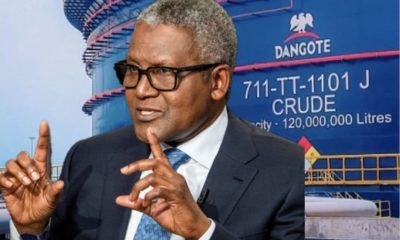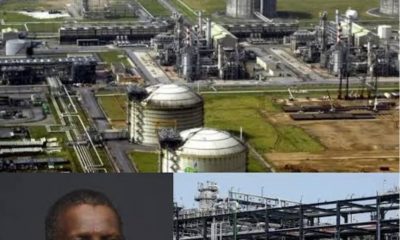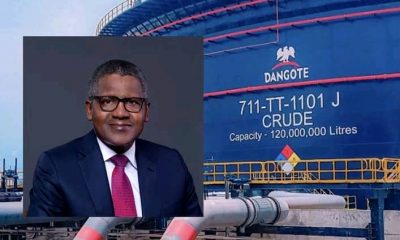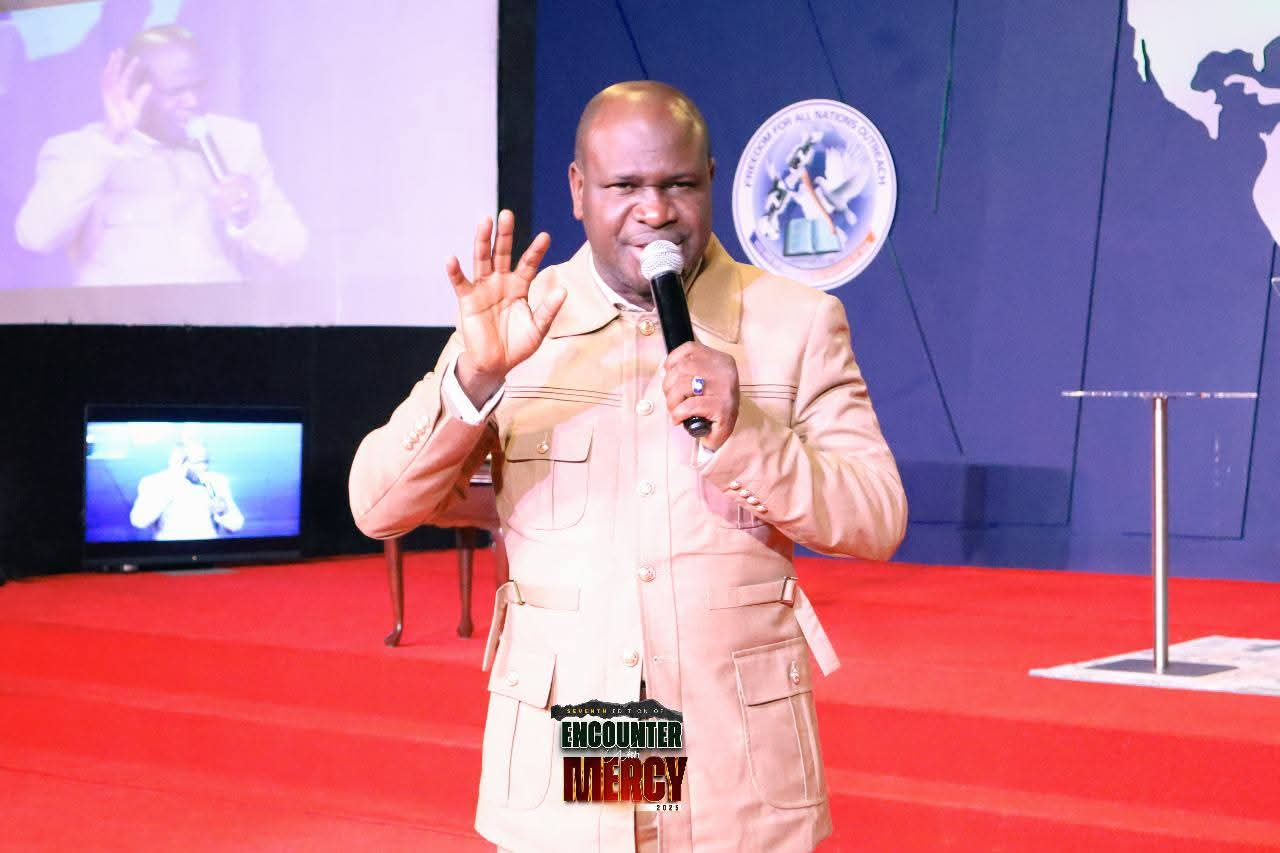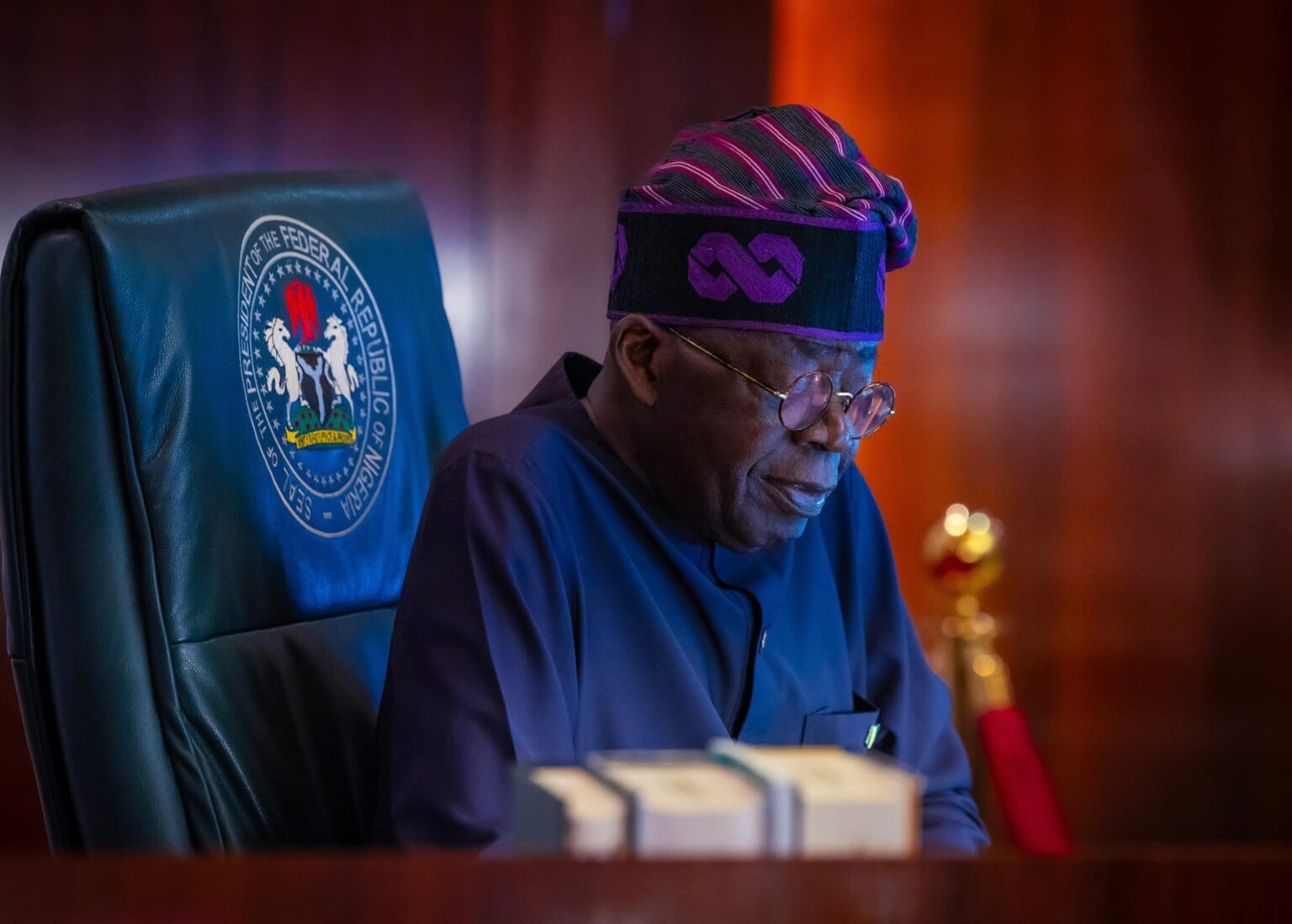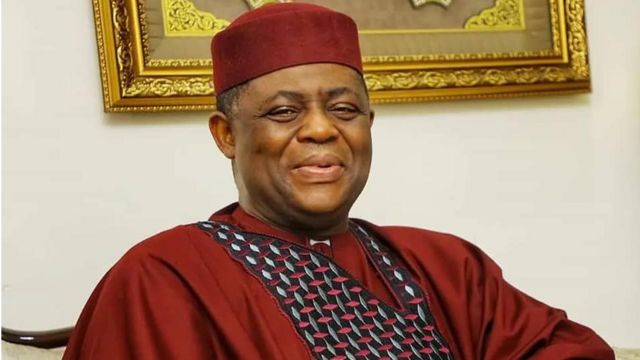Africa
FITCH DOWNGRADES DANGOTE INDUSTRIES RATINGS OVER LIQUIDITY POSITION

FITCH DOWNGRADES DANGOTE INDUSTRIES RATINGS OVER LIQUIDITY POSITION
Sahara Weekly Reports That Fitch Ratings has downgraded Dangote Industries Limited (DIL) due to what it says is the significant deterioration in the group’s liquidity position and uncertainty related to its ability to refinance maturing debt related to the syndicated loan raised to finance construction of Dangote Oil Refining Company (DORC).
Further delays in meeting the funding requirements would significantly increase the likelihood of financial restructuring or default and lead to further rating downgrade, according to Fitch.
“The downgrade reflects significant deterioration in the group’s liquidity position following lower than expected disposal proceeds, operational and financial underperformance compared to our prior expectations, also affected by local currency devaluation, and lack of contracted backup funding to repay its significant debt facilities maturing on 31 August 2024,” Fitch Ratings said in an update released Monday.
“We view the lack of DIL’s audited accounts for 2023 as a corporate governance issue.”
DIL has immediate debt servicing requirements related to the syndicated loan raised to finance the construction of Dangote Oil Refining Company (DORC).
Dangote Refinery has a nominal production capacity of 650,000 barrels per day (bpd) of refined oil products, which will be sold in both the Nigerian domestic and international markets.
During the First Half (1H) 2024 the refinery operated at around 50% capacity and produced between 325,000 bpd to 375,000 bpd.
“The EBITDA contribution from DORC has been far below our previous projection,” Fitch said.
Major currency devaluation in 2023, also caused the Dangote group to record a significant FX loss of N2.7 trillion in 2023 as the company faces a mismatch between USD denominated debt and domestic revenues. Fitch expects the devaluation to continue at a higher pace in 2024 leading to more losses.
The group plans to divest a 12.75% stake in DORC in 2024. The group intends to service its significant syndicated loan maturing in August 2024 from the equity divestment.
“However, timely divestment and meeting the imminent maturity is highly uncertain in our view,” Fitch said.
Fitch expects DIL’s EBITDA margins in cement production to drop further in 2024 following softer retail demand for cement particularly in the Nigerian market as well as limited ability to pass on increased raw material cost to consumers.
Fitch downgraded the National Long-Term Rating to ‘B+(nga)’ from ‘AA(nga)’ and senior unsecured debt rating issued by Dangote Industries Funding Plc to ‘B+(nga)’ from ‘AA(nga)’.
Fitch has simultaneously placed the ratings on Rating Watch Negative (RWN). The RWN reflects uncertainty related to the group’s ability to refinance maturing debt.
Fitch Cuts Dangote Industries on Worsening Liquidity, Possible Default on Refinery Debts
Africa
Prophecy Fulfilled: South Africa’s Police and Defence Crisis Foretold by Prophet Akinbodunse
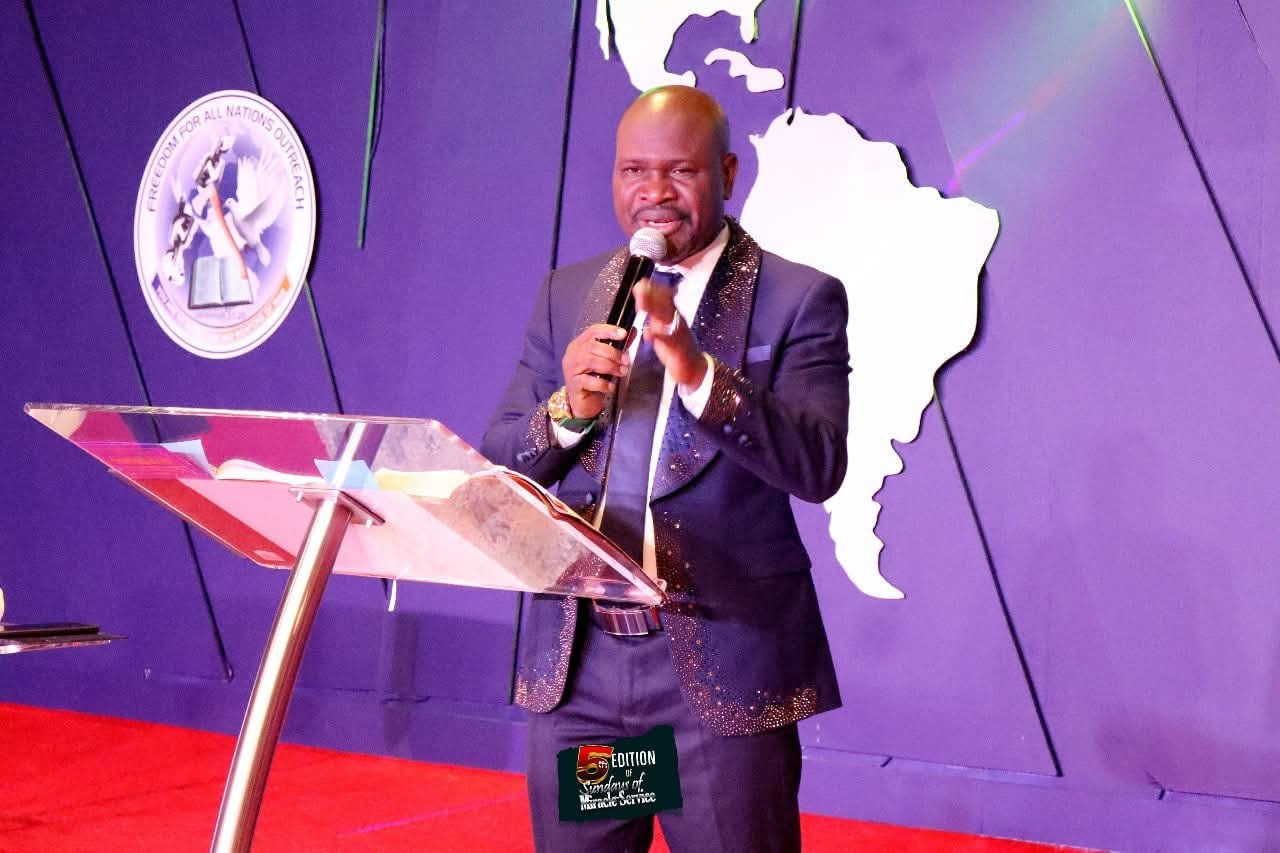
Prophecy Fulfilled: South Africa’s Police and Defence Crisis Foretold by Prophet Akinbodunse
Pretoria, South Africa — Renowned Nigerian-born prophet and founder of Freedom for All Nations Outreach (FANO), Prophet Samuel Akinbodunse, has once again seen one of his prophecies manifest, this time concerning South Africa’s defence and police institutions.
During the FANO Crossover Service, Prophet Akinbodunse delivered a striking revelation that the nation was heading into a season of turmoil within its security sector. He declared:
“I see trouble and drama in South Africa’s police and defence force. The Ministry of Defence should be prayed for, because many secrets will be revealed. Celebrated leaders must prepare, because ink on paper will be read. After this, I saw the door of the prison opening. Many politicians, police officials, and defence officers will face it, but the prison door will refuse to close.”
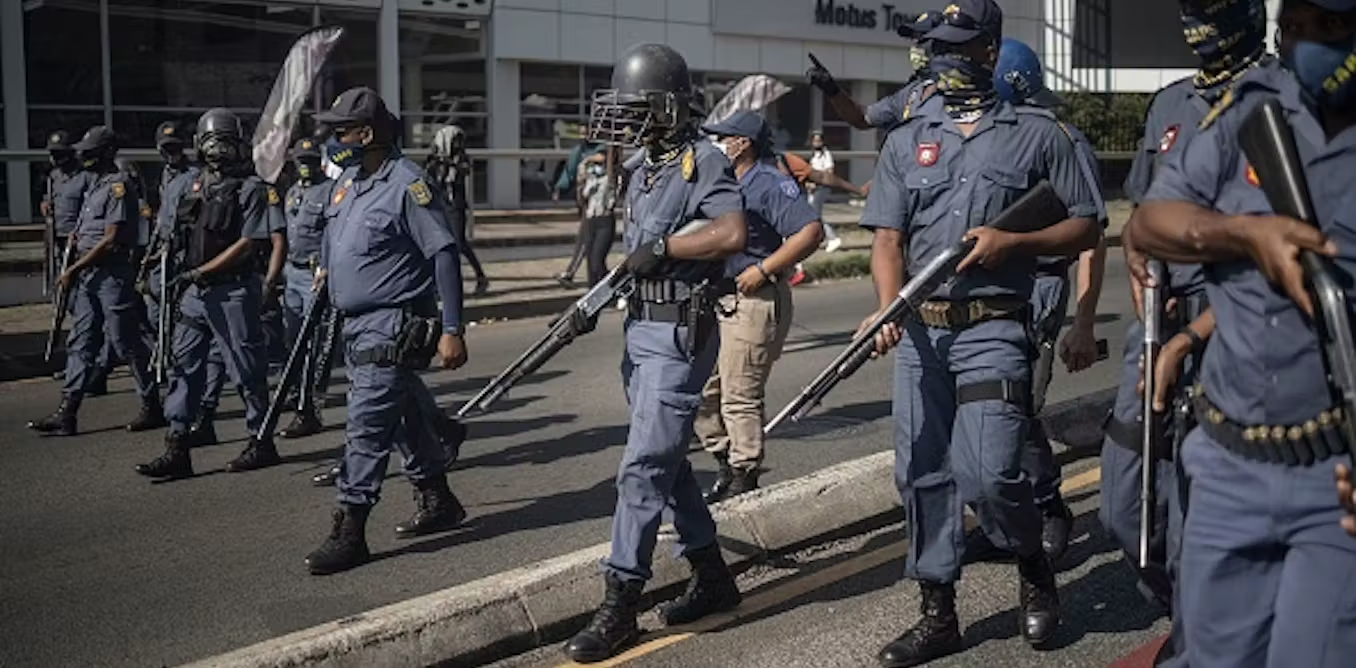
This prophecy has gained renewed attention following Lieutenant General Nhlanhla Mkhwanazi’s explosive allegations of corruption and political interference within the police service. Mkhwanazi revealed that more than 121 politically sensitive case dockets were allegedly removed and shelved under ministerial instruction. He further accused senior officials, including Deputy National Commissioner Shadrack Sibiya, of undermining justice and protecting powerful figures.

The revelations have shaken South Africa’s leadership, placing Police Minister Senzo Mchunu and the broader administration under heavy scrutiny. President Cyril Ramaphosa, in response, has placed Mchunu on a “leave of absence” and announced the establishment of a judicial commission of inquiry to investigate the far-reaching allegations.
For many observers, these unfolding events mirror Prophet Akinbodunse’s words with uncanny accuracy. His warning that “hidden secrets would be exposed” and that officials could face imprisonment is being echoed in the ongoing national scandal.
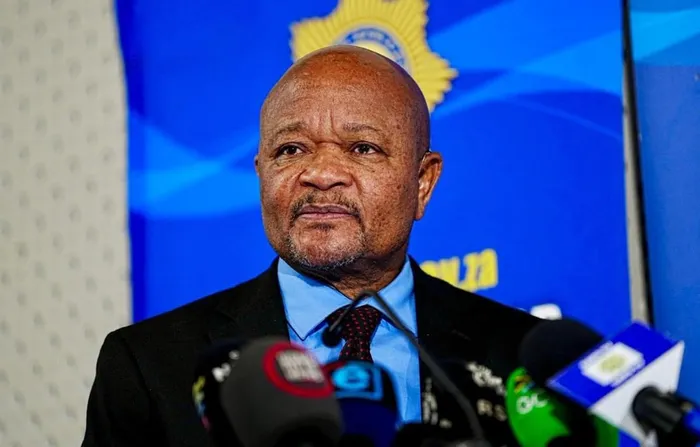
As the inquiry gathers momentum, South Africans are reflecting on the weight of the prophecy—seeing it as both a call to accountability and a reminder of the importance of prayer, repentance, and reform in leadership.
About Prophet Samuel Akinbodunse
Prophet Samuel Akinbodunse is the Founder and General Overseer of Freedom for All Nations Outreach (FANO), headquartered in Pretoria, South Africa. He also leads the Samuel Akinbodunse Foundation (SAF), a charitable initiative dedicated to empowering underprivileged communities. Widely respected for accurate national and international prophecies, his ministry continues to impact lives across nations.
Africa
Tinubu Takes Quick Steps To Help Niger Flood Victims, Assures Unwavering Support

Tinubu Takes Quick Steps To Help Niger Flood Victims, Assures Unwavering Support
Sahara Weekly Reports That In a heartfelt message released on Saturday, President Bola Ahmed Tinubu conveyed his deep concern and unwavering support for the people of Mokwa Local Government Area in Niger State, who have been severely impacted by recent floods that claimed lives and displaced families.
The President, in a personally signed statement, expressed his condolences to the affected families and the entire people of Niger State. “I have received with deep concern the distressing reports of severe flooding in Mokwa Local Government Area of Niger State, which has resulted in the tragic loss of lives and the displacement of families,” the statement read. “I extend my heartfelt condolences to the affected families and the good people of Niger State at this difficult time.”
Demonstrating proactive leadership, President Tinubu disclosed that he had immediately directed the activation of the National Emergency Response Centre and engaged the National Emergency Management Agency (NEMA) for a detailed briefing on the disaster’s scale and the urgent humanitarian needs. “Search-and-rescue operations are ongoing, and all relevant federal agencies have been mobilized to support the state government’s efforts,” he assured.
In a show of solidarity and compassion, President Tinubu emphasized that relief materials and temporary shelter assistance were already being deployed, ensuring that no Nigerian affected by the disaster would be left behind or neglected. “I assure all those impacted that your government stands with you,” he declared. “We will continue to coordinate with the Niger State Government to ensure a swift, coordinated, and compassionate response, one that prioritizes lives, restores dignity and accelerates recovery.”
The President also called on all Nigerians to stand united in prayer and support for their fellow citizens in Mokwa, highlighting the nation’s collective resilience and humanity during such trying times. “In times of adversity, we draw strength from our unity, resilience, and shared humanity,” he reminded.
Furthermore, President Tinubu directed security agencies to assist in emergency efforts, while tasking NEMA and the National Emergency Response Centre with ongoing coordination and timely updates to the nation.
Through this compassionate message and prompt action, President Tinubu reaffirmed his commitment to the safety and well-being of all Nigerians, especially in moments of tragedy. His words and actions underscore a government determined to leave no one behind, standing by its people when they need it most.
Africa
THE AFRICOM COMMANDER – By Chief Femi Fani-Kayode

THE AFRICOM COMMANDER – By Chief Femi Fani-Kayode
The man in the picture is General Michael E. Langley. He is an American—a four-star General in the United States Marine Corps and the current Commander of the United States Africa Command (AFRICOM).
To Pan-Africanists and true African nationalists, this man is not a friend. He is not an ally. He is an agent of Western imperialism—a willing instrument in the hands of those who seek to dominate, suppress, and exploit Africa. He represents a force that is determined to bleed us dry, discredit our leaders, and crush any progressive movement that emerges on this continent.
Recently, he called for the removal and elimination of Captain Ibrahim Traoré, the Head of State of Burkina Faso, accusing him of misappropriating the gold meant for his people. This is not the first time he has interfered in African affairs. He has repeatedly criticized African leaders and tried to discredit their efforts—unless, of course, they serve the interests of the CIA or bow to Western demands.
Langley only seems comfortable with African leaders who serve as puppets—those who tremble before Washington and parrot Western scripts. He has no regard for those who speak truth to power or strive for genuine African autonomy.
When the story of Africa’s journey is written, General Langley’s name will be remembered with shame and contempt. His legacy will be one of betrayal—a modern-day Quisling. He will be grouped with characters like Vidkun Quisling, the Norwegian traitor who collaborated with the Nazis; Kemi Badenoch, the British Conservative politician who denies her African roots; and “Uncle Tom,” the infamous fictional symbol of servility.
Despite his previous distasteful comments, Langley continues to spew provocative nonsense. During a television interview on Kenya’s Citizen TV on May 27th, he arrogantly declared:
“I have talked to a number of Ministers of Defence and Presidents and told them we were assessing. If we are that important to you, you need to communicate that and we will see.”
This statement reeks of arrogance and entitlement. After facing backlash from millions of Africans for meddling in our affairs, he still has the audacity to lecture us—talking down to sovereign nations as though we are schoolchildren begging for approval.
Who exactly does he think he is? Who gave him the right to assess us? Who invited him to Africa? What purpose has AFRICOM served in Africa other than spreading destabilization and discord?
In Nigeria, we have battled terrorism for over 15 years—fighting deadly insurgent groups like Boko Haram, Al Qaeda, and ISWAP. We reached out, time and again, for assistance and cooperation. But the U.S., under Langley’s command, turned its back on us. No meaningful military support. No satellite intelligence. No access to advanced weapons. Only empty words, lectures, and interference.
Instead of helping us, they have tried to weaken, undermine, and shame us. AFRICOM, under Langley’s leadership, has done nothing but feed chaos and exploit the resulting instability to justify its own presence.
They apply a familiar tactic—the Hegelian Dialectic: create the problem, observe the reaction, and then offer themselves as the solution. It’s a well-worn imperialist script. As British author David Icke aptly put it, it’s the “Problem-Reaction-Solution” formula used by Western powers to manipulate and subdue the Global South.
Let’s be clear: the West—and men like Langley—are the root of Africa’s suffering. We do not need their presence. We do not need their conditional aid, veiled threats, or false promises. We do not need their hypocrisy.
We need General Langley like we need poison. Like we need Ebola. Like we need AIDS, COVID, and cancer rolled into one. We need AFRICOM in Africa like we need cockroaches and rats in our homes.
Africa is no longer your playground. No longer your slave girl to be raped, plundered, and tossed aside. We are rising. We are finding our voice. We will choose our own leaders, solve our own problems, and forge our own path.
So take your occupying forces and leave. Pack your arrogance and imperialist agenda—and never come back.
We remember what you did to Patrice Lumumba, Thomas Sankara, Sylvanus Olympio, Kwame Nkrumah, Muammar Gaddafi, Gamal Abdel Nasser, Laurent Gbagbo, Murtala Mohammed, Jerry Rawlings, Ahmed Ben Bella, Robert Mugabe, Nelson Mandela, and countless others.
We remember how you undermined ECOMOG, destroyed North Africa and the Sahel, fueled terrorism in East Africa, and empowered the Boers in Southern Africa. We remember it all.
The blood of our heroes cries out for justice, and our continent now stands ready. We are done with foreign domination. We are done with puppets. We are done with silence.
In the name of God, go—and let Africa become the continent of greatness and dignity that it was always destined to be.
About the Author:
Chief Femi Fani-Kayode is the Sadaukin Shinkafi and Wakilin Doka Potiskum. He is a lawyer, a former Minister of Culture and Tourism, and a former Minister of Aviation in Nigeria.
(https://femifanikayode.org/the-africom-commander-by-chief-femi-fani-kayode/)
-

 celebrity radar - gossips6 months ago
celebrity radar - gossips6 months agoWhy Babangida’s Hilltop Home Became Nigeria’s Political “Mecca”
-

 society6 months ago
society6 months agoPower is a Loan, Not a Possession: The Sacred Duty of Planting People
-

 society5 months ago
society5 months agoReligion: Africa’s Oldest Weapon of Enslavement and the Forgotten Truth
-

 news6 months ago
news6 months agoTHE APPOINTMENT OF WASIU AYINDE BY THE FEDERAL GOVERNMENT AS AN AMBASSADOR SOUNDS EMBARRASSING



